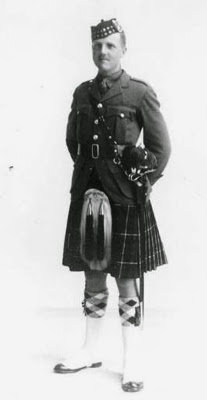Norman Baillie-Stewart
| Norman Baillie-Stewart | |
|---|---|

Baillie-Stewart in the uniform of the Seaforth Highlanders (1929-1933)
|
|
| Born |
Norman Baillie Stewart Wright 15 January 1909 London |
| Died | 7 June 1966 (aged 57) Dublin |
| Nationality |
|
| Other names | James Scott |
| Alma mater | Royal Military College, Sandhurst |
| Known for | Spying for Germany, making propaganda radio broadcasts during World War 2 |
| Criminal charge |
|
| Criminal penalty |
|
| Children | Two |
| Parent(s) | Lieutenant Colonel Cron Hope Baillie Wright (father) |
| Military career | |
| Allegiance |
|
| Service/branch |
|
| Years of service | 1927–1933 |
| Rank | Subaltern |
| Unit | Seaforth Highlanders |
Norman Baillie-Stewart (15 January 1909 – 7 June 1966) was a British army officer known as The Officer in the Tower when he was imprisoned in the Tower of London. An active sympathizer of Nazi Germany, he took part in German-produced propaganda broadcasts and is known as one of the men associated with the nickname Lord Haw-Haw.
Baillie-Stewart's father was Lieutenant Colonel Cron Hope Baillie Wright, an officer in the British Indian Army who served in the 62nd Punjabis during the First World War. His mother was from a family with a long tradition of military service.
Baillie-Stewart attended Bedford School and the Royal Military College, Sandhurst, where, as a cadet, he served as an orderly to Prince Henry, a younger son of King George V.
In January 1929, while still a cadet, he changed his surname from Wright to Baillie-Stewart, perhaps under the belief that he was looked down upon by more senior officers. He graduated tenth in the order of merit and in February 1929 received a commission as a subaltern in the Seaforth Highlanders although he soon grew to dislike army life.
In 1929 Baillie-Stewart was posted to the Seaforth's second battalion in India. In 1930 he saw active service on the North West Frontier where he was reprimanded by his company commander for removing a native banner from an Afridi tribal graveyard, which aggravated tensions with local tribesmen. He later replaced the banner on the orders of a senior officer. While a campaign medal was authorised for this campaign, Baillie-Stewart did not receive it. The roll of recipients compiled in September 1933, after his conviction, noted against his name "No medal, forfeited. Cashiered". He returned to England in early 1931, having applied for transfer to the Royal Army Service Corps.
...
Wikipedia
